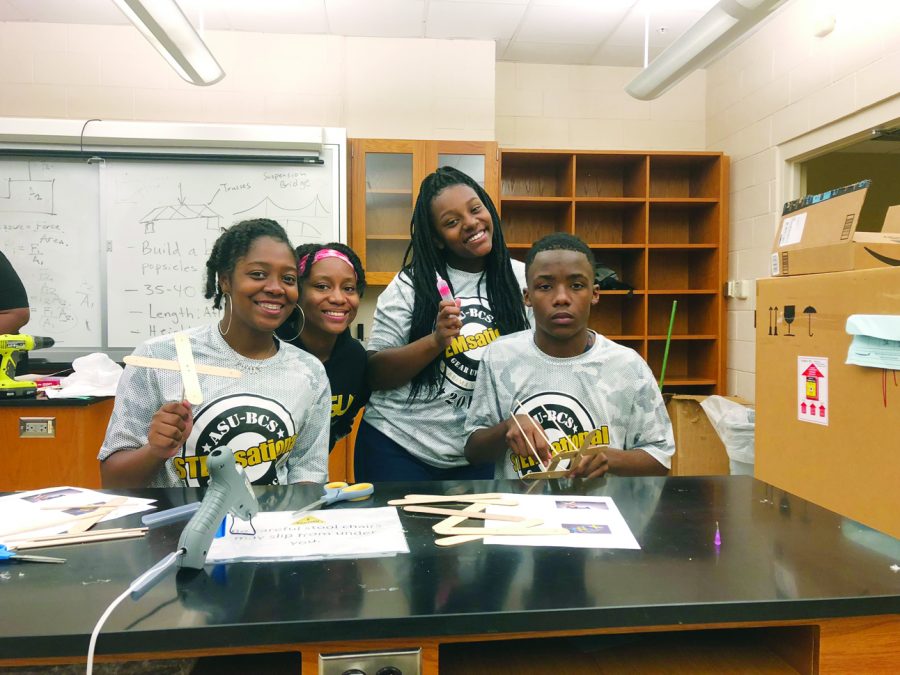GEAR UP Summer STEM Camp exposes Birmingham’s students to college life
“It is our hope that the students who participated in the GEAR-UP STEM Summer Camp initiative at Alabama State University found the program to be enlightening and inspiring. We always endeavor to offer unique experiences that will foster innovative thought and scientific creativity,” said Carl Pettis Ph.D, Director of GEAR UP Summer STEM Camp and Interim Associate Provost of Academic Affairs.
Entering their fifth year of existence, the Birmingham City School (BCS) GEAR UP STEM Program was created to prepare low income students for college and expose them to college life by partnering with various universities across the state. Through their studies before creating this program, they found that students from low income areas look at college as something they cannot achieve due to their circumstances.
“99.9999% of our students are African American and because our main focus is college prep we have to tailor our program to them. College prep for someone from the suburbs vs Birmingham City schools is completely different. Some of their dreams have ceilings and we want to show them that there is no ceiling and if you need an example look around,” said Alice McClain, the program coordinator at ASU.
In hopes to help show these students that college is feasible, ASU has spent the past three years partnering with BCS GEAR UP. During the summer, each university they partner with holds two camps that are each two weeks long. Each year, ASU follows one cohort of students beginning with rising seventh and eighth grades up until they go off to college meaning this year the 120 students participating are rising 10th and 11th graders. The program is fully financed, all the students must do to be eligible is be apart of Birmingham City Schools and choose where they want to go.
“Our first year we had 30 students from each grade. This year we were able to take 60 from each grade bringing the total to 120. We are the only HBCU (historically black college/university) and the response was amazing from students! The kids are jumping to be in this program,” McClain said on the exponential growth of the program. “Despite the fact we started later than the other institutions, we have grown to be one of the premier programs. The younger camp fills within the first four hours and the other fills up within eight.”
While at ASU, the students are stay on campus throughout the week to complete their studies and are allowed to go home every weekend using the ASU bus. The three prong effect of ASU’s camp revolves around preparation for their upcoming grade, ACT preparation, and college preparation. As they have class everyday, the program prepares them for college by giving them the same responsibilities as a normal college freshman where no one is waking them up, no one is telling them to go to class they are completely responsible for themselves.
“We want them to feel comfortable with the fact that you know mom’s not here, there’s nobody waking you up, no one is telling you what you have to do. That they are totally responsible for what they have to do and if they do not do it there are repercussions. For example, if they do not go to class they must go home because that’s like college, you miss class your GPA drops your attendance is going to drop and them that’s it,” McClain said.
Despite starting later than the other institutions, ASU’s camp has become a premier camp partially because of their constantly changing curriculum. The place importance on STEM (science, technology, engineering, and mathematics) awareness especially as minority interest in it is low due to the fact they believe it is hard. Noticing this, ASU hires different progressors to teach them different STEM disciplines to keep both the students and faculty engaged. For example, this year robotics, engineering, and forensics was the discipline were the students were able to build video games, process crime scenes, and other hands on activities.
“I know they are not going to remember everything, but if they can leave here with one positive thing our job is done,” McClain said commenting on how using this camp is changing the rhetoric of the students. “The first year it was ‘if I go to college’ now it is ‘when I go to college’. I want the camp to do something positive that they remember … Just the fact that ASU was able to play a part in making a positive influence on a child is so important to me.”


